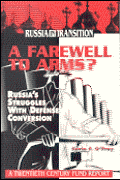The effort to reshape American foreign policy over the past six years has established at least one fact: that a world of new possibilities must inevitable be a word of uncertainties. The changes in international affairs set in motion by the transformation of the Soviet Union already have exceeded the expectations of even the most far-seeing observers of a decade ago. But, of course, we know only the beginning of the story. No longer an enigma wrapped in a riddle, the politics and economics of the Eurasian successors to the USSR remain more the object of the conjecture than settled subjects.
In A Farewell to Arms?, Kevin P. O’Prey defines conversion in the broadest sense as reallocation of human, physical, and financial resources to civilian pursuits. He makes clear that too often a more limited conception, say, of transforming factories or production lines, leads to faulty policymaking and practical frustration.
In the pages that follow, the author also provides a useful and detailed road map of the industrial organization of the defense sector in Russia, including the structure of typical individual enterprises. He reviews the brief history of attempt to convert, starting with the command approach of the Gorbachev era. His account is likely to provide fresh insights into the daunting nature of the problem of conversion and the current weaknesses of the Russian state.
Few would argue with the authors assessment that defense conversion is key to market reform and this to the establishment of a firm base for democratic capitalism in Russia. Despite the current political mood in Washington–one that seems to gainsay forceful American action in international affairs–O’Prey is surely headed in the right direction. One can hope that the author’s effort will help to rekindle a desire in American political circles to vigorously debate the nation’s role in Russia’s formation. If it does nothing else, his work should make readers more realistic about the problems of conversion. The fair-minded will, as well, be more appreciative of the fact that, even if the results seem few and slow, the effort under way in Russia should be admired an must be supported.
Authors
